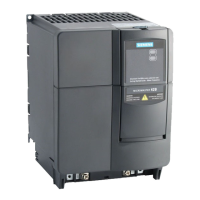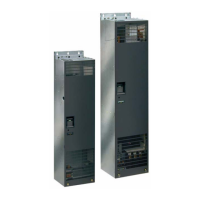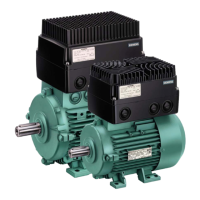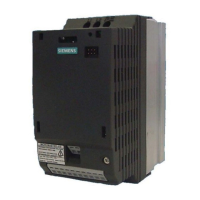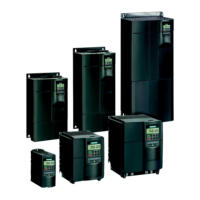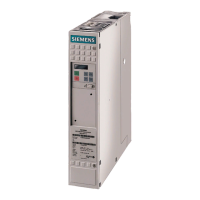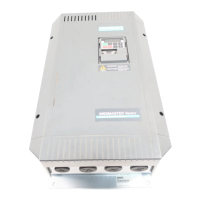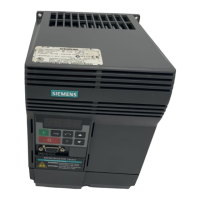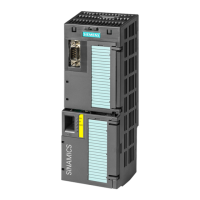© Siemens plc 1999© Siemens plc 1999
G85139-H1751-U529-D1G85139-H1751-U529-D1
To gain access to the power and control terminals:To gain access to the power and control terminals:
Frame size 4, 5 :Frame size 4, 5 :
remove the four M4 screws from the front cover and remove the cover from the inverter.remove the four M4 screws from the front cover and remove the cover from the inverter.
Frame size 6:Frame size 6:
remove the six M4 screws remove the six M4 screws
from the front cover and remove the cfrom the front cover and remove the c
over from the inverter.over from the inverter.
Frame size 7:Frame size 7:
remove the four M4 screws from the lower front cover and remove the lower front cover fromremove the four M4 screws from the lower front cover and remove the lower front cover from
the inverter.the inverter.
Ensure that the motor is configured for the correct supply voltage.Ensure that the motor is configured for the correct supply voltage.
Make sure that the input power supply is isolated before making or changing any connections.Make sure that the input power supply is isolated before making or changing any connections.
When synchronous machines are connected or when coupling several motors in parallel, theWhen synchronous machines are connected or when coupling several motors in parallel, the
inverter must be operated with voltage/frequency control characteristic (P077= 0 or 2) and slipinverter must be operated with voltage/frequency control characteristic (P077= 0 or 2) and slip
compensation must be disabled (P071 = 0).compensation must be disabled (P071 = 0).
The control, power supply and motor leadsThe control, power supply and motor leads
be laid separately. They must be laid separately. They must
through the same cable conduit/trunking.through the same cable conduit/trunking.
High voltage insulation test equipment mustHigh voltage insulation test equipment must
be used on cables connected to the inverter.be used on cables connected to the inverter.
Use screened cable for the control cable, Class 1 60/75Use screened cable for the control cable, Class 1 60/75
C copper wire only.C copper wire only.
Feed the cables through the correct glands in the base of the inverter. Secure the cable glands to the inverterFeed the cables through the correct glands in the base of the inverter. Secure the cable glands to the inverter
and connect the leads to the power, motor and control terminals in accordance with the information supplied inand connect the leads to the power, motor and control terminals in accordance with the information supplied in
sections 3.2.1 and 3.2.2. Ensure that the leads are connected correctly and the equipment is properly earthed.sections 3.2.1 and 3.2.2. Ensure that the leads are connected correctly and the equipment is properly earthed.
Frame size 4 and 5:Frame size 4 and 5:
Tighten up each of the power and motor terminal screws to 1.1 NmTighten up each of the power and motor terminal screws to 1.1 Nm
Frame size 6:Frame size 6:
Tighten up each of the power and motor terminal Allen-screws to 3.0 NmTighten up each of the power and motor terminal Allen-screws to 3.0 Nm
Frame size 7:Frame size 7:
Tighten up each of the M12 power and motor terminal nuts to 30 Nm.Tighten up each of the M12 power and motor terminal nuts to 30 Nm.
Secure the front cover to the inverter when all connections are complete.Secure the front cover to the inverter when all connections are complete.
Ensure that the powEnsure that the pow
er source supplies er source supplies
the correct voltage the correct voltage
and the necessary and the necessary
Ensure that theEnsure that the
appropriate circuit-breaker or fuses with the specified current rating are connected between the powerappropriate circuit-breaker or fuses with the specified current rating are connected between the power
supply and invertersupply and inverter
(see section 8)(see section 8)
Connect the powConnect the pow
the power termithe power termi
nals L1, L2, nals L1, L2,
L3 (3 phase) L3 (3 phase)
shown in Figure 3.2.1shown in Figure 3.2.1
using a 4-core cable and lugs to suit the cable size. For the cross-section of each core, see section 8.using a 4-core cable and lugs to suit the cable size. For the cross-section of each core, see section 8.
Use a 4-core screened cable and suitable lugs to connect the motor leads to the motor terminals U, V, WUse a 4-core screened cable and suitable lugs to connect the motor leads to the motor terminals U, V, W
and earth (PE) (and earth (PE) (
shown in Figure 3.2.1shown in Figure 3.2.1
For operation with cables longer than 25m see section 1.3.4For operation with cables longer than 25m see section 1.3.4
If required, connect the braking If required, connect the braking
unit leads to the DCunit leads to the DC
- and DC+ terminals.- and DC+ terminals.
Asynchronous Asynchronous
individually or in parallel.individually or in parallel.
If a synchronous If a synchronous
motor is connected motor is connected
to the inverter, to the inverter,
the motor current the motor current
times greater than that expected so the inverter must be de-rated accordingly.times greater than that expected so the inverter must be de-rated accordingly.
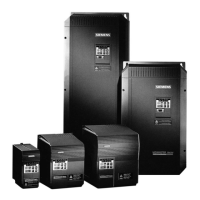
